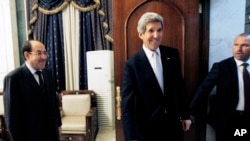BAGHDAD —
U.S. Secretary of State John Kerry made a surprise visit to Baghdad, where he pressed Prime Minister Nouri al-Maliki to block Iran from using Iraq to resupply embattled Syrian President Bashar al-Assad.
Secretary Kerry says he and Maliki had "a very spirited discussion" about Iranian shipments to Syria at a time when the United States and other supporters of the Syrian opposition are working to get President Bashar al-Assad to give up power.
"For those of us engaged in that effort, anything that supports President Assad is problematic," Kerry said. "And I made it very clear to the prime minister that the overflights from Iran are in fact helping to sustain President Assad and his regime."
Iraqi officials say Iranian flights to Syria are humanitarian.
U.S. officials say Iran is sending weapons and fighters to Syria on "near-daily" flights, a volume of traffic they say shows Iran's involvement is not entirely humanitarian.
Last September, the Maliki government told then-Secretary of State Hillary Clinton it would start inspecting Iranian flights to Syria. But U.S. officials say only two planes have been searched, and both were found to be carrying humanitarian supplies.
Secretary Kerry says he told Prime Minister Maliki that Americans, including members of Congress, are increasingly watching what Iraq is doing "and wondering how it is that a partner in the efforts for democracy and a partner for whom Americans feel they have tried so hard to be helpful" can be doing something that makes it more difficult to achieve common goals."
Ten years after the invasion to topple Saddam Hussein, U.S. influence in Iraq appears eclipsed by Iran as Prime Minister Maliki backs Syria's government, and his Shia supporters dominate Sunni and Kurd opponents.
Johns Hopkins University Professor Ruth Wedgwood says the prime minister is quite candid about his support for Iran's Shia leaders, especially following the withdrawal of nearly all U.S. troops from Iraq.
"There really is nobody for them to worry about," Wedgwood said. "And Maliki seems quite content to have a perpetually unsettled Iraq in which the Sunni will sooner or later find their means to take revenge, but for the moment it is a Shia nation."
U.S. Institute of Peace analyst Steve Heydemann says war in Syria worsens the region's Shia/Sunni divide.
"It is sharpening sectarian divisions within those neighboring countries in ways that could have very, very troubling consequences for stability in those countries," Heydemann said. "And I think Iraq is one of the countries most at risk of instability as a result of the Syrian conflict."
Prime Minister Maliki's Cabinet has delayed next month's provincial elections in two largely-Sunni provinces due to what it says are concerns for the safety of poll workers.
Secretary Kerry says the Obama administration believes very strongly that everyone needs to vote simultaneously. So he is asking the Maliki Cabinet to take another look at its decision, a reconsideration that he says the prime minister told him is "appropriate."
Secretary Kerry says he and Maliki had "a very spirited discussion" about Iranian shipments to Syria at a time when the United States and other supporters of the Syrian opposition are working to get President Bashar al-Assad to give up power.
"For those of us engaged in that effort, anything that supports President Assad is problematic," Kerry said. "And I made it very clear to the prime minister that the overflights from Iran are in fact helping to sustain President Assad and his regime."
Iraqi officials say Iranian flights to Syria are humanitarian.
U.S. officials say Iran is sending weapons and fighters to Syria on "near-daily" flights, a volume of traffic they say shows Iran's involvement is not entirely humanitarian.
Last September, the Maliki government told then-Secretary of State Hillary Clinton it would start inspecting Iranian flights to Syria. But U.S. officials say only two planes have been searched, and both were found to be carrying humanitarian supplies.
Secretary Kerry says he told Prime Minister Maliki that Americans, including members of Congress, are increasingly watching what Iraq is doing "and wondering how it is that a partner in the efforts for democracy and a partner for whom Americans feel they have tried so hard to be helpful" can be doing something that makes it more difficult to achieve common goals."
Ten years after the invasion to topple Saddam Hussein, U.S. influence in Iraq appears eclipsed by Iran as Prime Minister Maliki backs Syria's government, and his Shia supporters dominate Sunni and Kurd opponents.
Johns Hopkins University Professor Ruth Wedgwood says the prime minister is quite candid about his support for Iran's Shia leaders, especially following the withdrawal of nearly all U.S. troops from Iraq.
"There really is nobody for them to worry about," Wedgwood said. "And Maliki seems quite content to have a perpetually unsettled Iraq in which the Sunni will sooner or later find their means to take revenge, but for the moment it is a Shia nation."
U.S. Institute of Peace analyst Steve Heydemann says war in Syria worsens the region's Shia/Sunni divide.
"It is sharpening sectarian divisions within those neighboring countries in ways that could have very, very troubling consequences for stability in those countries," Heydemann said. "And I think Iraq is one of the countries most at risk of instability as a result of the Syrian conflict."
Prime Minister Maliki's Cabinet has delayed next month's provincial elections in two largely-Sunni provinces due to what it says are concerns for the safety of poll workers.
Secretary Kerry says the Obama administration believes very strongly that everyone needs to vote simultaneously. So he is asking the Maliki Cabinet to take another look at its decision, a reconsideration that he says the prime minister told him is "appropriate."




